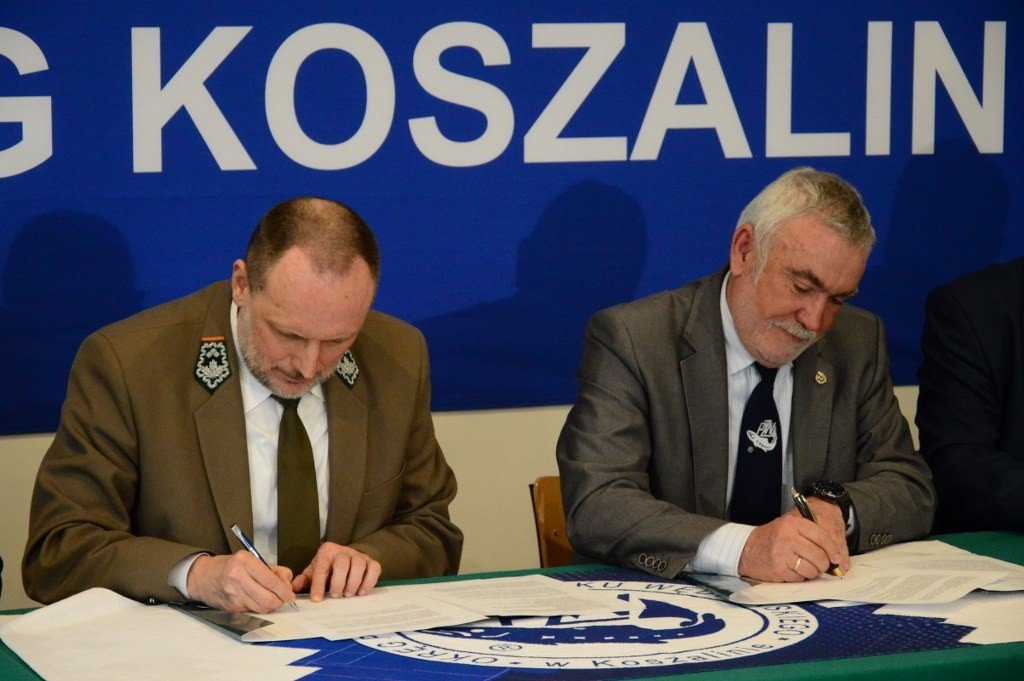 Asset Publisher
Asset Publisher
The State Forests National Forest Holding
The State Forests National Forest Holding is the largest organisation in the European Union managing forests, which belong to the State Treasury and celebrating its 90 anniversary this year.
Presently, we manage the area of one third of Poland's territory. Not long after the end of the Second World War, there was only 21 % of the area. Every year we plant 500 million of new trees, as we want Polish forests grow all the time.
Every year Polish foresters plant 500 million of trees.
85 % of nature reserves in Poland are located within the State Forests. 40 % of the forests managed by General Directorate of the State Forests are protected within the framework of European network Natura 2000. We fight against many threats: natural disasters, plaques of insects, trees' diseases, fires, pollutions, as well as poaching and vandalism.
We take care the forestry supplying the market with timber, as ecological and universal material, to be carried on in accordance with rules of balanced development (photography P.Fabjański).
One of our major tasks is making forests accessible to the society. We invite you to take advantage of these beautifully located within the forest wilderness holiday resorts, forester's lodges or guest rooms. That is for you, we create thousand kilometres of hiking trails, cycling paths or camping sites. All the above mentioned, you can find in service www.czaswlas.pl.
We also take care the forestry supplying the market with timber, as ecological and universal material, to be carried on in accordance with rules of balanced development. We obtain over 30 million of cubic meters of wood annually, twice as much as at the beginning of the nineties of the XX century.
Despite of this, the average of wood abundance per hectare of our forests is one fourth bigger than 20 years ago and 40% bigger than the average of European Union currently amounts.
In Poland in sectors connected with the forestry, there work about 375 thousand of people. It means that each 40 working Pole works in the forest.
In Poland in sectors connected with the forestry, there work about 375 thousand of people. It means that each 40 working Pole works in the forest. The sector of wood processing works out approximately 8 % of our GDP (Gross Domestic Product). Among others, thanks to the timber from the State Forests Poland is the 10 largest producer of furniture in the world, and the 4 largest furniture exporter.
The State Forests employ 25 thousand people. That way we are the 9 biggest employer in Poland. Among the largest companies in our country it takes 22 place in respect of its incomes and 11 place in respect of its profits. The value of assets, we manage, reaches 300 million zl. If we add social values, it will be worth one billion zlotych. We do not use money from the budget, but we earn money on our own to support the business. In spite of the financial crisis, since 2002, we continuously note down profits. Moreover, we pay taxes amounting 1,3 billion zl annually.
87 % of Poles think, the foresters are competent. We willingly share our knowledge of Polish forests, of their history and of nature values with the others. We publish books, periodicals, brochures; we also administer the website www.lasy.gov.pl . For children, the youth and teachers, we prepared internet service "E-lynx' Lynx Forest" (www.erys.pl). Our staff has supported schools in field of nature education for years. We also organise many actions to let people broaden their knowledge about forest, nature and ecology.
 Asset Publisher
Asset Publisher
 Asset Publisher
Asset Publisher
Współpraca pomiędzy PZW i PGL LP – podpisano listy intencyjne
Współpraca pomiędzy PZW i PGL LP – podpisano listy intencyjne
Fot. Łukasz Suchanowski
W marcu i kwietniu 2025 roku podpisane zostały dwa listy intencyjne pomiędzy Regionalną Dyrekcją Lasów Państwowych w Szczecinku a Okręgami Polskiego Związku Wędkarskiego w Koszalinie i w Słupsku.

Podpisane dokumenty, jeszcze bardziej podkreslają dążenia wszystkich zainteresowanych podmiotów do ścisłej współpracy na rzecz poprawy dostępności do jezior położonych na terenach zarządzanych przez Lasy Państwowe oraz stworzenia bezpiecznej, przyjaznej środowisku infrastruktury dla osób zajmujących się gospodarką rybacką i amatorskim połowem ryb.
– List intencyjny to początek wspólnych działań na rzecz gospodarki leśnej i wodnej – podkreśla Tomasz Plewa, prezes PZW w Koszalinie. – Dzięki porozumieniu nie zwiększy się liczba udostępnionych akwenów, ale zwiększy się komfort dostępu do tych, które już są użytkowane. Dziś do wielu jezior prowadzi tylko jeden dojazd, a wędkarze muszą pokonywać znaczne odległości z ciężkim sprzętem – wyjaśnia.
Zgodnie z ustaleniami, PZW zobowiązuje się do budowy slipów oraz pomostów przy jeziorach zlokalizowanych na terenach leśnych, natomiast RDLP Szczecinek odpowiada za organizację dojazdu i stworzenie odpowiednich miejsc parkingowych.
– Porozumienie pozwala nadleśnictwom na łatwiejsze podpisywanie indywidualnych umów z kołami wędkarskimi, co ułatwi wędkarzom dostęp do jezior – mówi Jarosław Czarnecki, dyrektor RDLP w Szczecinku. – Obowiązujące przepisy leśne są bardzo rygorystyczne, jeśli chodzi o udostępnianie dróg leśnych pojazdom silnikowym, co utrudniało korzystanie z nich przez wędkarzy.
Współpraca dotyczy czterech głównych obszarów:
- Zapewnienia dojazdu do łowisk.
- Organizacji miejsc postoju pojazdów.
- Zapewnienia możliwości wodowania łodzi.
- Jasnego oznakowania tych miejsc w terenie.
Listy intencyjne zakładają także możliwość realizacji wspólnych projektów współfinansowanych ze środków krajowych i unijnych, działania edukacyjne, wymianę informacji oraz inicjatywy legislacyjne.
– Cieszę się, że dochodzi do podpisania listu intencyjnego mówiącego o woli współpracy dwóch instytucji o szczególnym znaczeniu dla ochrony środowiska – podkreślił senator Stanisław Gawłowski podczas spotkania w Koszalinie. – Widać tu wspólną odpowiedzialność i zrozumienie, że zarówno gospodarka leśna, jak i rybacka powinny być prowadzone z poszanowaniem zasad i reguł przyrodniczych.

Podpisane listy intencyjne z PZW w Koszalinie (24.03.2025 r.) oraz w Słupsku (01.04.2025 r.) nie mają charakteru prawnie wiążącego, ale stanowią jasną deklarację woli współpracy, której efekty będą odczuwalne dla tysięcy wędkarzy korzystających z jezior w lasach Pomorza Środkowego.


 fot. Paweł Fabijański
fot. Paweł Fabijański
 fot. Paweł Fabijański
fot. Paweł Fabijański
 fot. Paweł Fabijański
fot. Paweł Fabijański






